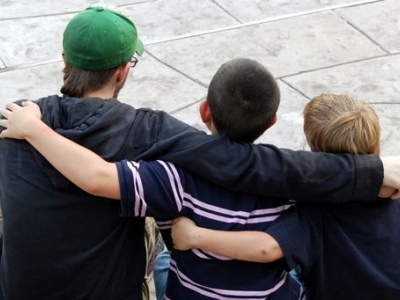
Discipline: I don’t think it means what you think it means
What does Paul mean when he says "bring them up in the discipline and instruction of the Lord"?
In The Princess Bride, Vizzini, the Sicilian, keeps using the word “inconceivable”. He uses it again and again, like when the Dread Pirate Roberts avoids a major fall despite having his climbing rope cut. Inigo Montoya, the swordsman, voices what we have all been thinking: “You keep using that word; I do not think it means what you think it means.”
The same can be true of a big issue in Christian parenting, and it comes from this verse:
Children, obey your parents in the Lord, for this is right. "Honor your father and mother" (this is the first commandment with a promise) "that it may go well with you and that you may live long in the land." Fathers, do not provoke your children to anger, but bring them up in the discipline and instruction of the Lord. (Ephesians 6:1)
There is not a great deal of teaching in the NT that is explicitly about the task of parenting. What that means amongst other things, is that we must be all the more careful to understand properly what direction and guidance we have been offered. Ephesians 6:1-4 is one of the few passages that addresses the topic. But when we get to verse four, I wonder if Paul would say to us (but probably not in a Spanish accent) “Discipline. I do not think it means what you think it means.”
Three kinds of discipline
So what kind of discipline is Paul talking about?
Military Discipline. If it is military discipline, the word can sound to us as if childhood can and should be regimented. What we as parents are to do is to direct the troops under our command. Whether or not we require them to intone, “Sir, yes sir!” their role is to obey.
Schoolyard Discipline. Perhaps discipline is more of the schoolyard kind. Discipline is about maintaining control of the reins, keeping the upper hand. It’s about making rules to keep ill-discipline in check, ensuring that the rules are kept and issuing appropriate punishments when they are not.
Technical Discipline. Or maybe discipline is essentially about making sure that there is a level of precision in all that is done. Discipline is about dotting each of the i’s and crossing all the t’s. It’s about doing things properly because that is the best way to do them. And that is normally code for doing things how I like them to be done.
If Paul were to hear his passage explained in any of these ways he may just say, “Discipline. I do not think it means what you think it means.”
Paul's meaning of discipline
The Greek word that he used has to do with an organised and coherent training package. This training had the aim of cultivating familiarity with the cultural markers and traditions of a community. The training would be offered in order to acquire an appreciation of the key elements of that culture. Even more, the hope and expectation is that through involvement in the program, participants will develop a sense of identity that is fully aligned with that culture and that tradition. They will tell its stories and sing its songs. They will take in its norms, and live out its values. Furthermore we see that for Paul, the implementation of the program is shaped by the caring and nurturing command “bring them up”, the same word that was used in 5:29.
“Bring them up in the discipline ... of the Lord” envisages that parents will teach their children the broad contours of the story of salvation: call and obedience, anointing and service, justice and mercy. It supposes that we will discuss together why we say the things we do in the communion service, or what is it about baptism that ties in with the beginning of faith. It anticipates that our children will be told the stories about those heroes who have stood up for Jesus in the past, and about the role models whose examples shine out to the world today. It means that we will share with them the Psalms, and we will teach our children to pray. We will remember together our past, join them in asking for grace to handle the present, and look forward with them in the hope of the resurrection.
Andy Stirrup teaches Children’s ministry and family ministry at Youthworks College, Sydney.
For more articles from Growing Faith, subscribe to our monthly e-newsletter.
To hear about the latest books and resources from Youthworks Media, subscribe here.







